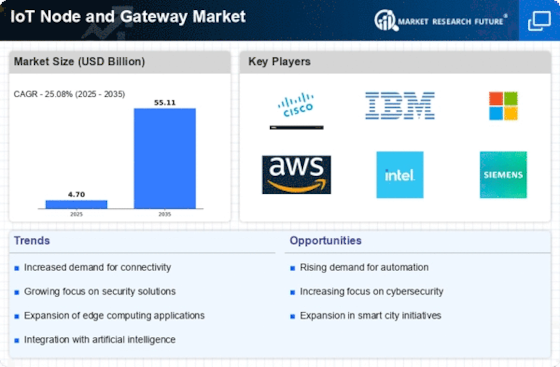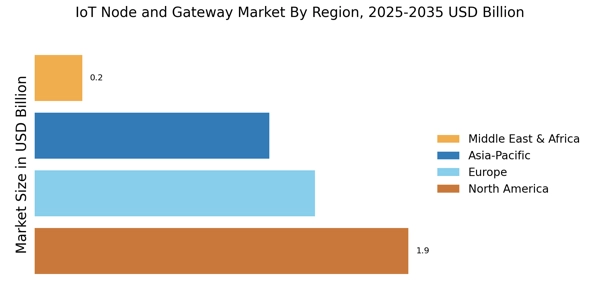Rising Demand for Smart Devices
The proliferation of smart devices is a primary driver for the IoT Node and Gateway Market. As consumers increasingly adopt smart home technologies, wearables, and connected appliances, the need for efficient communication between these devices intensifies. According to recent estimates, the number of connected devices is projected to reach over 30 billion by 2030, necessitating robust IoT nodes and gateways to manage data flow and connectivity. This surge in demand compels manufacturers to innovate and enhance their offerings, thereby expanding the IoT Node and Gateway Market. Furthermore, the integration of these devices into everyday life fosters a seamless user experience, which is likely to further accelerate market growth.
Increased Focus on Data Analytics
The increasing focus on data analytics is a crucial driver for the IoT Node and Gateway Market. As organizations collect vast amounts of data from connected devices, the need for effective data processing and analysis becomes paramount. IoT nodes and gateways are essential for aggregating and transmitting this data to cloud platforms where advanced analytics can be performed. The IoT Node and Gateway is projected to reach USD 274 billion by 2022, indicating a growing recognition of the value of data-driven decision-making. This trend is likely to spur demand for IoT solutions that can seamlessly integrate with analytics platforms, thereby enhancing the capabilities of the IoT Node and Gateway Market.
Growing Adoption of Industrial IoT
The industrial sector's growing adoption of IoT technologies serves as a significant driver for the IoT Node and Gateway Market. Industries such as manufacturing, logistics, and energy are increasingly utilizing IoT solutions to enhance operational efficiency and reduce costs. Reports indicate that the industrial IoT market is expected to reach USD 1 trillion by 2025, highlighting the substantial investment in IoT nodes and gateways to facilitate data collection and analysis. These devices play a crucial role in enabling real-time monitoring and predictive maintenance, which are essential for optimizing production processes. Consequently, the demand for reliable and scalable IoT solutions is likely to propel the growth of the IoT Node and Gateway Market.
Advancements in Network Infrastructure
The ongoing advancements in network infrastructure significantly influence the IoT Node and Gateway Market. The rollout of 5G technology is particularly noteworthy, as it promises to enhance connectivity speeds and reduce latency, which are critical for IoT applications. With 5G expected to cover a substantial portion of the population by 2026, the demand for IoT nodes and gateways that can leverage this technology is likely to increase. Additionally, improvements in Wi-Fi standards and the expansion of LPWAN (Low Power Wide Area Network) technologies are also contributing to a more robust infrastructure. This evolution in network capabilities enables more devices to connect simultaneously, thereby driving the growth of the IoT Node and Gateway Market.
Regulatory Support for IoT Initiatives
Regulatory support for IoT initiatives is emerging as a pivotal driver for the IoT Node and Gateway Market. Governments across various regions are recognizing the potential of IoT technologies to enhance public services, improve infrastructure, and drive economic growth. Initiatives aimed at fostering smart cities and connected transportation systems are gaining traction, leading to increased investments in IoT solutions. For instance, policies promoting the deployment of smart meters and environmental monitoring systems are likely to create a favorable environment for the IoT Node and Gateway Market. This regulatory backing not only encourages innovation but also instills confidence among stakeholders, thereby facilitating market expansion.
















